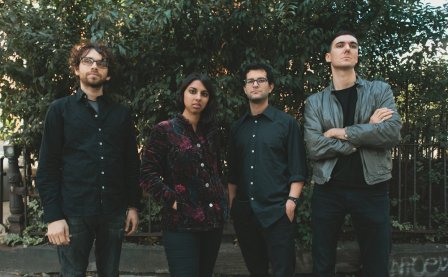English/Anglo folk music is a centuries-old form whose origins pre-date even the stringed instruments best associated with it. Historically, it walked a thin line between Christianity and the occult, documenting tales of love, theft, spells, charms, and brokenness by peons. The songs, transmitted throughout the isle by bards, served to entertain and communicate the happenings of the wider world. Known typically as Irish folk music’s lesser cousin in both vitality and musicianship, its subtle melodies and freer form left it open for the insertion of narratives. It has also been reinterpreted over the years. Chances are, your local Renaissance Festival features a lute player with a repertoire of reverent ballads. But in addition to that guy, folks like Nick Drake revamped the form with post-industrial melancholy and surrealism. Richard and Linda Thompson, Shirley Collins, and the Fairport Convention electrified it. Current 93 use its minor-key phrasing to frame its apocalyptic tales. Which brings us to the latest group to reinterpret the form, Seaven Teares, a collective of experimental folk artists from Brooklyn.
Having taken their name from a piece written for the lute by John Dowland, a Renaissance composer, Seaven Teares play a form of English folk that’s both reverent to the ancestral form and experimental. On this year’s debut, Power Ballads, the group, composed of Charlie Looker, Amirtha Kidambi, Russell Greenberg, and Robbie Lee, plays on the textures of the music’s overwhelmingly melancholy feel. They wrap notes upon one another to form subtle, churning ragas, breathe ethereal melodies using woodwinds, and generate rhythm from minimalist percussion. In so doing, it culls elements of the natural world with a sense of history and precision balladry. Yet upon first listen, the most striking musical quality is the interplay between Looker’s and Kidambi’s vocals. Although much is made of Looker’s penchant for incorporating monastic chants into his work, most recently in his Extra Life project, Kidambi matches his octave-defying verses note for note. But instead of eliciting the pleasing, melancholy harmonies one may expect, the male-female vocals produce an unsettling incongruity that mates perfectly with the album’s themes of sex, shame, and betrayal.
Power Ballads forgoes the urge to write about dewy garden flowers and old country graveyards and instead covers topics already well-documented in Charlie Looker’s discography. “Meet Me” pleasantly opens the album, speaking wryly of blushing and kisses before revealing the black-veiled world at its core: “Meet me where you blush, meet me at your skin/ Kiss me through the bars, unsmiling in pleasure/ Meet me where you end, where the world begins/ Bars of coke await us there and then we’ll flee to separate rooms to cry.” This poignant though unspectacular introduction lures us into a realm where quiet hypnotic instrumentation evolves into obscuring thin veils and long, black curtains of lust-evoking hair. In “Grown Woman,” a folk-raga piece with dripping percussion, Looker tempts, “Cry like a little girl,” causing a gushing atonal whine from Kidambi that lurches out of the soundscape. The highlight is the group’s take on another Dowland piece, “Flow My Tears.” Matching the original with a melancholy that drizzles upon each note, Seaven Teares stretch the notes into long, contemplative drones. They do the same on their reboot of Alice in Chains’ “Them Bones,” which replaces alt-rock contrivances with a tolling, repetitive riff. Again, Looker and Kidambi sing together, this time with woodwinds breathing gently through and a xylophone distantly twinkling.
Power Ballads seems to fracture as it progresses, like a bard at first sweetly strumming and poetically articulating the good and evil of common people, but who then inexplicably goes haywire: He stares off into space. The audience surrounding him grows unsettled. He plays a note and becomes contemplative. His voice grows awkward and repetitive. He forgets the words to his ballad, instead casting the narrative burden upon the instrument he wields. He is not mad, he is in a trance, one that’s capable of glimpsing the endless expression of melancholy.
More about: Seaven Teares



